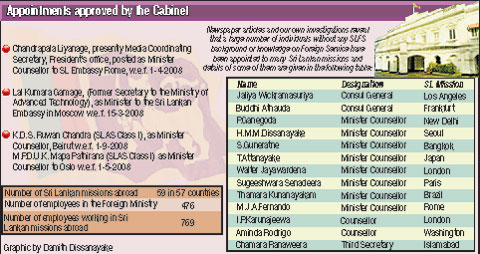Sri Lanka's Foreign Service has been highly politicized with the Cabinet of Ministers usurping the powers of the Public Service Commission (PSC) and making appointments in violation of the Constitution and the accepted norms, the Transparency International Sri Lanka has charged.
"At present a series of (Foreign Service) appointments are being made by the cabinet on the recommendation of the Foreign Minister, etc. Thus the question is whether the cabinet has power to make such appointments," says the TISL, a civic action group committed to building a nation of integrity.
"There are no provisions (in the Constitution) permitting the Cabinet of Ministers to make appointments to the ranks of the Foreign Service," the TISL says in a position paper published recently.
It says the President has powers to appoint heads of diplomatic missions in terms of Article 33 (c) of the Constitution, but candidates for other diplomatic positions such as minister, minister counsellor, counsellor and the first, second and third secretaries, must be chosen and appointed from the Sri Lanka Foreign Service (SLFS).
The TISL says any appointment made outside the process set out in the 17th Amendment's Article 55, which upholds the functions of the PSC, and the Sri Lanka Foreign Service Minute -- gazetted on January 24, 2004 -- is illegal.
The group says even appointments made by the president go unscrutinsed because of the ineffectiveness of the Parliamentary High Posts Committee. "The High Posts Committee has been totally ineffective, intransparent and serves no purpose," the TISL notes.
The TISL points out that even clerks to missions abroad are required to be appointed from the Public Management Assistant Service after a competitive examination. But the Cabinet has appointed a considerable number of persons who have neither been in the Management Assistants' Service nor have sat the competitive examinations.
"There is emerging evidence that many Sri Lanka Administrative Service (SLAS) Officers, hand picked by the Cabinet on undisclosed criteria, are posted to various ranks of the Foreign Service. There is no valid rationale for this, except permitting political authorities to hand pick their favourites for diplomatic postings. This too is contrary to the Minute and thus contrary to the Constitution," the TISL paper says.
The group alleges there is an information blackout regarding the criteria for diplomatic postings, names, backgrounds of those who have been appointed, the basis of appointment or the number of vacancies.
The practice of appointing cronies instead of qualified career diplomats has contributed to the negative foreign relationships at mission levels and has an adverse effect on the morale of the duly recruited and competent officers in the SLFS.
Adding to the SLFS officers' frustration, Sri Lanka Administration Service Officers are also being appointed to SLFS posts, the TISL paper points out, giving recent cases in a footnote reference (See graphic).
In its recommendations, the TISL says:
(a) All appointments governed under the SLFS should strictly be filled from and among the SLFS officers and by the PSC. At no stage the Cabinet should exercise these powers, contrary to the 17th Amendment to the Constitution.
(b) The Management Assistant appointments in missions must also be made on merit and be based on a competitive examination.
(c) All safeguards must be made to prevent the Head of the State abusing constitutional power to make appointments including Heads of Missions. This should include published criteria for such appointments, an effective and transparent scrutiny by Parliament and by the Constitutional Council.
(d) Criteria should be formulated, adopted and followed based on international best practices to prevent the questionable recruitments in the Foreign Service.
(e) Information of appointees and selection process should be in the public domain and should be readily available on the web.
(f) Sri Lanka does not have an effective diplomatic Code of Ethics. Ad hoc recruitments as set out above has diminished the quality of the diplomatic service particularly integrity, honesty, objectivity and impartiality. Unfortunately by perpetuating these practices the Sri Lankan diplomatic service (which is otherwise capable of meeting its objectives) would not be able to meet the core values expected of it. |

